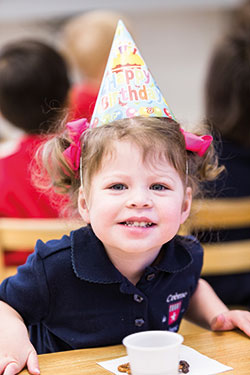
Download the PDF of Essential Experiences...Parties
Many adults have fond memories of childhood parties. With gloomy, cold days ahead of us, planning a party with children can be a wonderful way to start the New Year. Traditional party games can also provide plenty of learning opportunities for children and so can easily be used as a great learning tool.
BENEFITS
There is a wide range of benefits that come from planning for and being involved in a party.
Cognitive development Planning a party requires strategic thinking, which includes sequencing. Children can pick up these skills if they are involved in conversations about planning with an adult. Working in this way would be a good example of sustained, shared thinking.
Language development Preparing for a party is likely to generate a lot of ideas, as well as talking. Children will also have the opportunity to use language to persuade and also negotiate with others. In addition, planning for a party will help children gain specific vocabulary such as ‘napkins’, ‘dishes’ and ‘guests’.
Emotional development Being involved in the preparation of a party can help children feel competent and so can support their overall self-esteem. Children’s emotional development is also supported as they learn to self-regulate strong emotions during games, especially if they are losing!
Social development Parties are a social gathering and so by their nature are good at supporting children’s social development. Planning a party can help children to learn to think about others and their likes and dislikes. It also involves working alongside others in the preparation. During the party itself, children also learn from joining in party games. Skills such as turn taking and being part of a team are likely to be developed.
 PLANNING A PROGRAMME
PLANNING A PROGRAMME
As planning and being involved in parties provide children with many learning opportunities, it is worth thinking about planning several over the course of the year. You may, for example, wish to celebrate particular events such as the anniversary of your setting or to thank someone for their interest and hard work.
There may also be parties to mark the leaving of children or a staff member.
Practical matters
To enjoy all the benefits of organising a party, it is worth allowing sufficient time for the planning so that children can be involved with preparing the food, the guest list and place names, as well as learning and choosing some party games. It is also important to check that parents are happy with the focus of the party as some parents may object to certain themes, such as Halloween.
It is also important to double-check dietary requirements and restrictions, particularly if food is bought or brought in. It can be worth small groups of children, alongside an adult, being responsible for different tasks related to the party. This might include one group of children who shop and prepare the food, another that makes and puts up decorations and another one that plans party games. If several parties are planned during the year, the tasks can be rotated so that children try out different roles.
Building on children’s learning
There are many ways of building on children’s learning following a party. One of the best ways is to create a book with children so that afterwards they can revisit and tell the story of the party. Children can choose different photographs to illustrate each stage of the party and its preparation and suggest captions for each photograph for the adult to scribe. Some children may also wish to mark-make and add captions in their own way. In addition, it is worth sharing a range of picture books with children about parties, such as the classic Spot’s Birthday Party by Eric Hill.
HOME LEARNING
While some children still play games at home, some parents may not realise the importance of games for social development. Sharing with parents some of the simple party games that they can play as a family such as musical statues or hunt the thimble can be helpful.
It is also worth talking to parents about the importance of children learning to take turns, but also learning to lose gracefully. It is often tempting for adults to make sure that young children always win a game, but this can backfire later as children will not always be able to win every game that they play.









